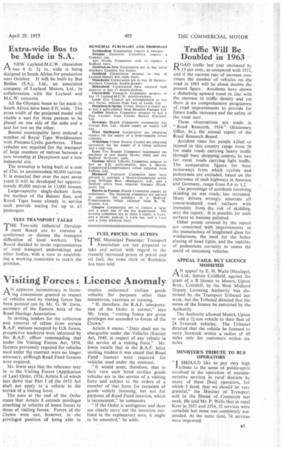Visiting Forces : Licence Anomaly
Page 37

If you've noticed an error in this article please click here to report it so we can fix it.
AN apparent inconsistency in licensing concessions granted in respect of vehicles used by visiting forces has been pointed out by Mr. G. W. Irwin, secretary of the Eastern Area of the Road Haulage Association.
In inviting tenders for the collection and removal of refuse from certain R.A.F. stations occupied by U.S. forces, prospective tenderers were informed by the R.A.F. officer commanding that under the Visiting Forces Act, 1954. licences previously required for vehicles used under the contract were no longer necessary, although Road Fund licences were required.
Mr. Irwin says that the reference may be to the Visiting Forces (Application of Law) Order, 1954, Article 8 of which lays down that Part I of the 1933 Act shall not apply to a vehicle in the service of a visiting force.
The note at the end of the Order states that Article 8 extends privileges attaching to vehicles of home forces to those of visiting force& Forces of the Crown were not, however, in the privileged position of being able to
employ unlicensed civilian goods vehicles for purposes other than manceuvres, exercises or training.
"If, therefore, the R.A.F. interpretation of the Order is correct," says Mr. Irwin, "visiting forces are given privileges not accorded, to forces of the Crown."
Article 8 states: " Duty shall not be chargeable under the Vehicles (Excise) Act, 1949, in respect of any vehicle in the service of a visiting force." Mr. Irwin recalls that in the R.A.F. letter inviting tenders it was stated that Road Fund licences were required for vehicles used under the contract.
"It would seem, therefore, that in their view such hired civilian goods vehicles are in the service of a visiting force and subject to the orders of a member of that force for purposes of goods vehicle licensing, but not for purposes of Road Fund taxation, which is inconsistent," he comments.
"If the Order is ambiguous and does not clearly carry out the intention outlined in the explanatory note, it ought to be amended," he adds.




































































































